MG414: Organisational Behaviour Report on HSBC's Culture
VerifiedAdded on 2023/01/12
|12
|3475
|27
Report
AI Summary
This report provides a comprehensive analysis of organisational behaviour within HSBC, a multinational financial institution. It begins by identifying HSBC's culture using Charles Handy's model, specifically highlighting its role culture. The report then explores the effectiveness of communication within HSBC, differentiating between verbal and nonverbal communication, as well as vertical and horizontal channels. Furthermore, the report evaluates the role of culture in employee motivation, utilizing Maslow's Hierarchy of Needs to understand motivational factors. Finally, the report assesses how HSBC can leverage its organisational culture to enhance its overall success. The analysis incorporates both primary and secondary research, as required by the assignment brief, to provide a well-rounded understanding of HSBC's organizational dynamics. The report aims to provide a detailed overview of HSBC's organizational culture, its impact on employee motivation and communication and provide recommendations to enhance organizational success.
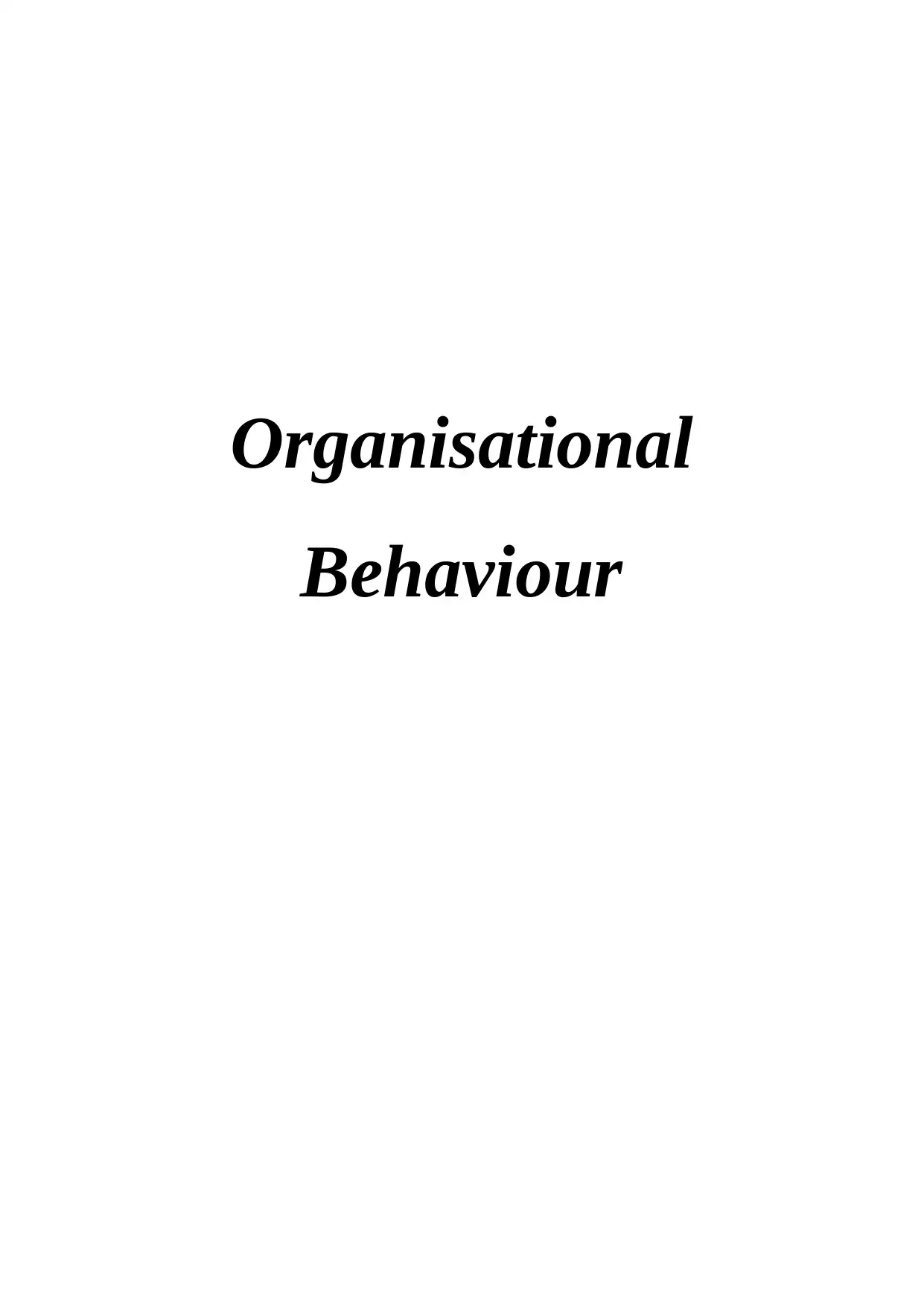
Organisational
Behaviour
Behaviour
Paraphrase This Document
Need a fresh take? Get an instant paraphrase of this document with our AI Paraphraser
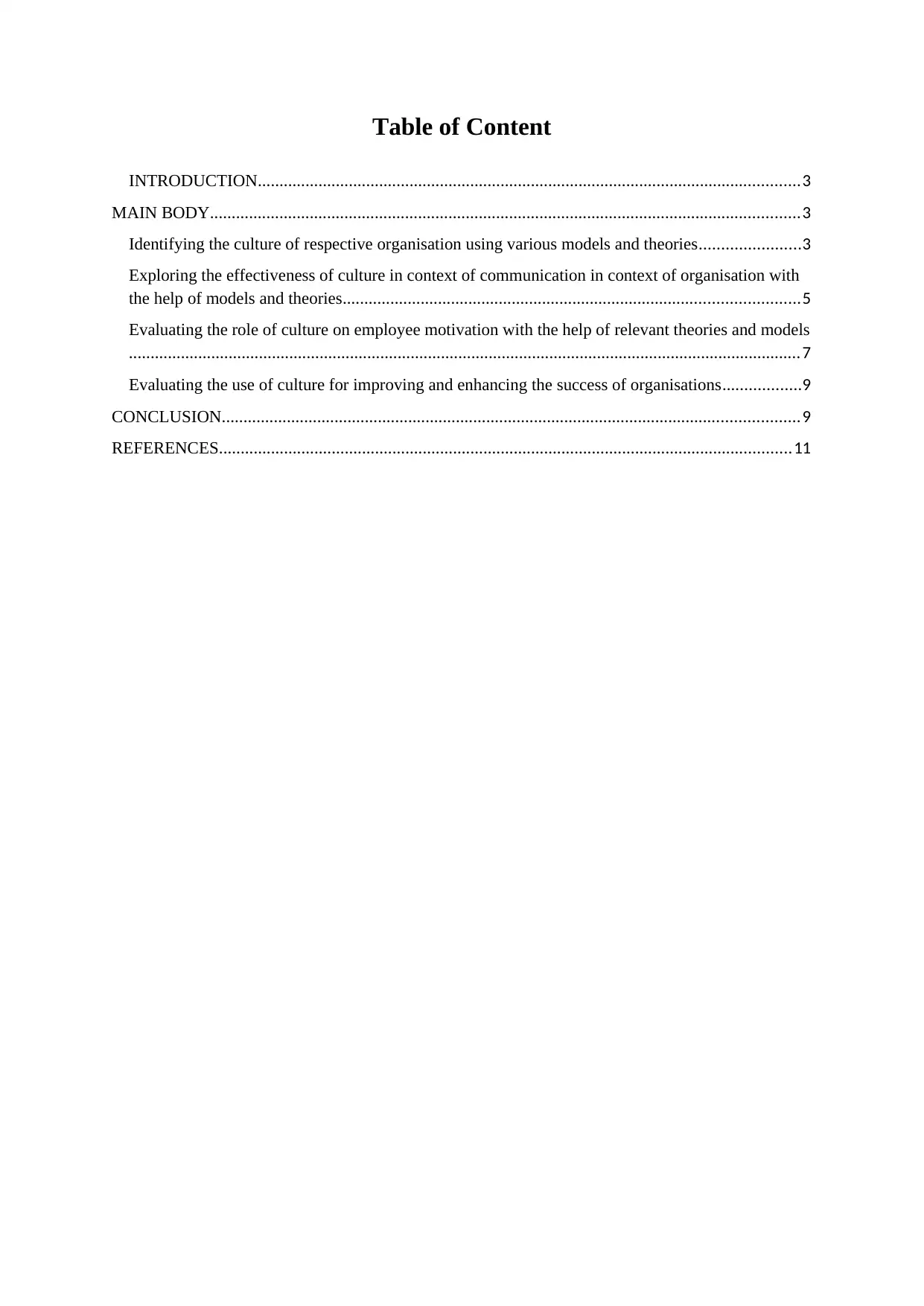
Table of Content
INTRODUCTION.............................................................................................................................3
MAIN BODY........................................................................................................................................3
Identifying the culture of respective organisation using various models and theories.......................3
Exploring the effectiveness of culture in context of communication in context of organisation with
the help of models and theories.........................................................................................................5
Evaluating the role of culture on employee motivation with the help of relevant theories and models
...........................................................................................................................................................7
Evaluating the use of culture for improving and enhancing the success of organisations..................9
CONCLUSION.....................................................................................................................................9
REFERENCES....................................................................................................................................11
INTRODUCTION.............................................................................................................................3
MAIN BODY........................................................................................................................................3
Identifying the culture of respective organisation using various models and theories.......................3
Exploring the effectiveness of culture in context of communication in context of organisation with
the help of models and theories.........................................................................................................5
Evaluating the role of culture on employee motivation with the help of relevant theories and models
...........................................................................................................................................................7
Evaluating the use of culture for improving and enhancing the success of organisations..................9
CONCLUSION.....................................................................................................................................9
REFERENCES....................................................................................................................................11
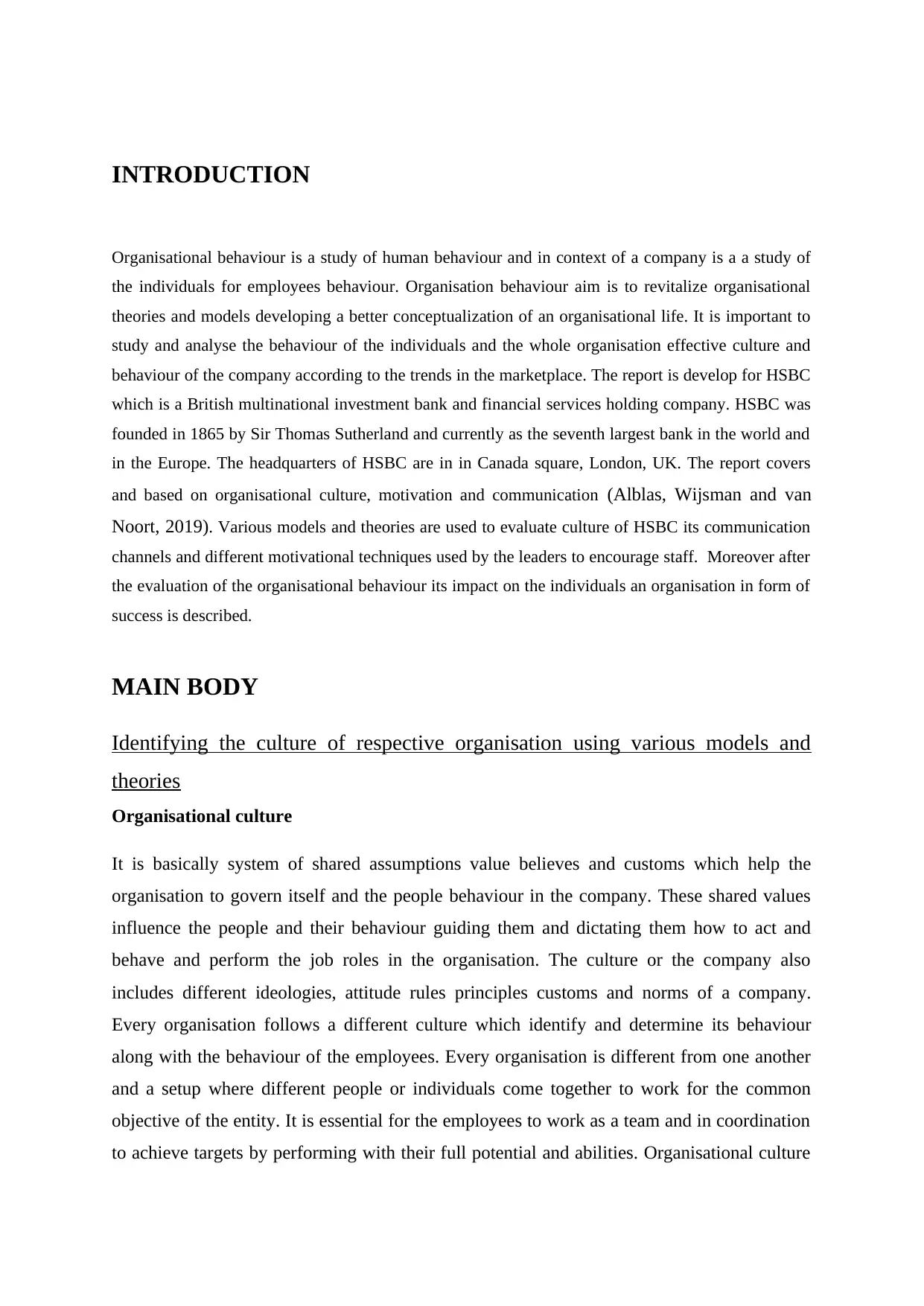
INTRODUCTION
Organisational behaviour is a study of human behaviour and in context of a company is a a study of
the individuals for employees behaviour. Organisation behaviour aim is to revitalize organisational
theories and models developing a better conceptualization of an organisational life. It is important to
study and analyse the behaviour of the individuals and the whole organisation effective culture and
behaviour of the company according to the trends in the marketplace. The report is develop for HSBC
which is a British multinational investment bank and financial services holding company. HSBC was
founded in 1865 by Sir Thomas Sutherland and currently as the seventh largest bank in the world and
in the Europe. The headquarters of HSBC are in in Canada square, London, UK. The report covers
and based on organisational culture, motivation and communication (Alblas, Wijsman and van
Noort, 2019). Various models and theories are used to evaluate culture of HSBC its communication
channels and different motivational techniques used by the leaders to encourage staff. Moreover after
the evaluation of the organisational behaviour its impact on the individuals an organisation in form of
success is described.
MAIN BODY
Identifying the culture of respective organisation using various models and
theories
Organisational culture
It is basically system of shared assumptions value believes and customs which help the
organisation to govern itself and the people behaviour in the company. These shared values
influence the people and their behaviour guiding them and dictating them how to act and
behave and perform the job roles in the organisation. The culture or the company also
includes different ideologies, attitude rules principles customs and norms of a company.
Every organisation follows a different culture which identify and determine its behaviour
along with the behaviour of the employees. Every organisation is different from one another
and a setup where different people or individuals come together to work for the common
objective of the entity. It is essential for the employees to work as a team and in coordination
to achieve targets by performing with their full potential and abilities. Organisational culture
Organisational behaviour is a study of human behaviour and in context of a company is a a study of
the individuals for employees behaviour. Organisation behaviour aim is to revitalize organisational
theories and models developing a better conceptualization of an organisational life. It is important to
study and analyse the behaviour of the individuals and the whole organisation effective culture and
behaviour of the company according to the trends in the marketplace. The report is develop for HSBC
which is a British multinational investment bank and financial services holding company. HSBC was
founded in 1865 by Sir Thomas Sutherland and currently as the seventh largest bank in the world and
in the Europe. The headquarters of HSBC are in in Canada square, London, UK. The report covers
and based on organisational culture, motivation and communication (Alblas, Wijsman and van
Noort, 2019). Various models and theories are used to evaluate culture of HSBC its communication
channels and different motivational techniques used by the leaders to encourage staff. Moreover after
the evaluation of the organisational behaviour its impact on the individuals an organisation in form of
success is described.
MAIN BODY
Identifying the culture of respective organisation using various models and
theories
Organisational culture
It is basically system of shared assumptions value believes and customs which help the
organisation to govern itself and the people behaviour in the company. These shared values
influence the people and their behaviour guiding them and dictating them how to act and
behave and perform the job roles in the organisation. The culture or the company also
includes different ideologies, attitude rules principles customs and norms of a company.
Every organisation follows a different culture which identify and determine its behaviour
along with the behaviour of the employees. Every organisation is different from one another
and a setup where different people or individuals come together to work for the common
objective of the entity. It is essential for the employees to work as a team and in coordination
to achieve targets by performing with their full potential and abilities. Organisational culture
⊘ This is a preview!⊘
Do you want full access?
Subscribe today to unlock all pages.

Trusted by 1+ million students worldwide
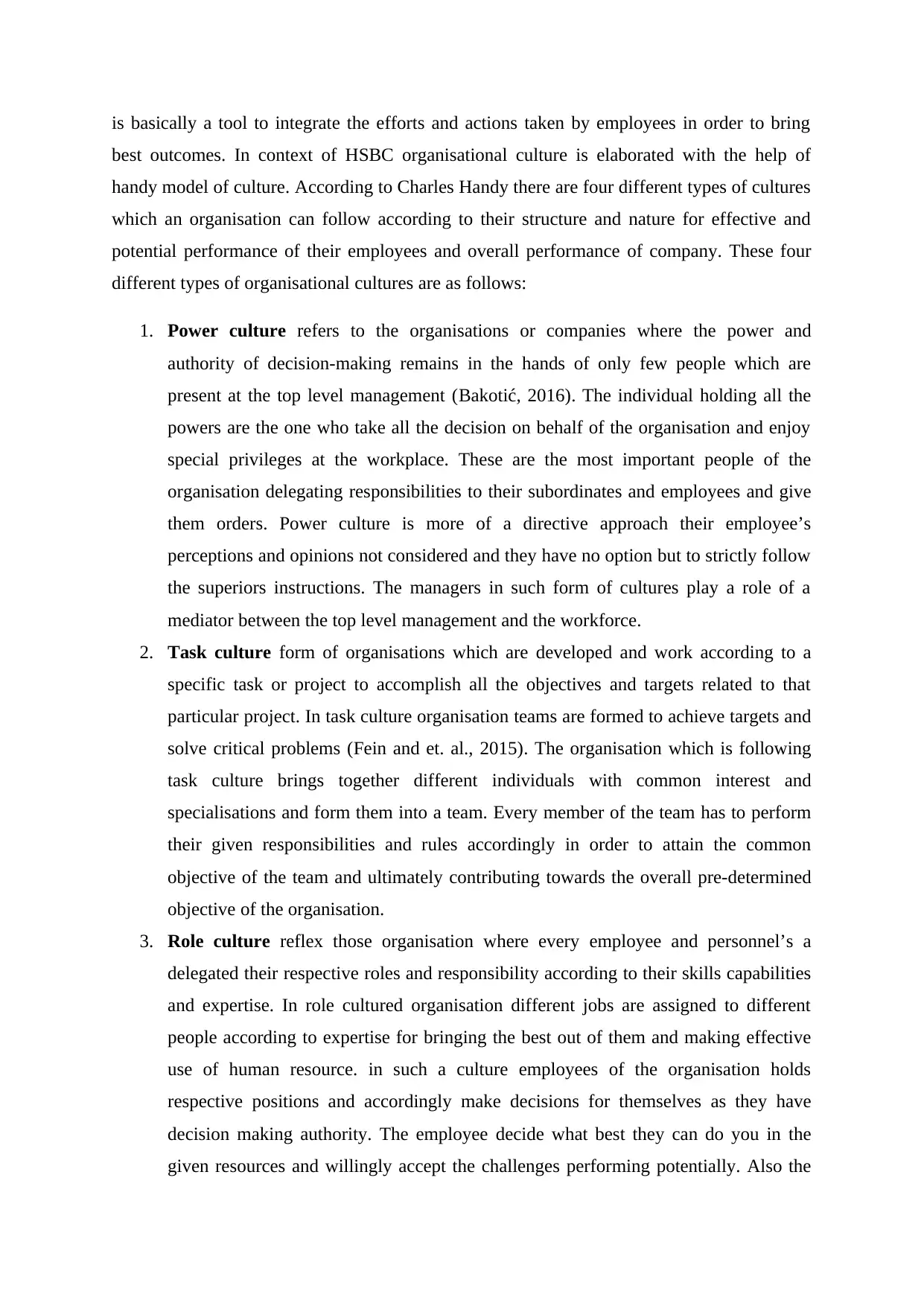
is basically a tool to integrate the efforts and actions taken by employees in order to bring
best outcomes. In context of HSBC organisational culture is elaborated with the help of
handy model of culture. According to Charles Handy there are four different types of cultures
which an organisation can follow according to their structure and nature for effective and
potential performance of their employees and overall performance of company. These four
different types of organisational cultures are as follows:
1. Power culture refers to the organisations or companies where the power and
authority of decision-making remains in the hands of only few people which are
present at the top level management (Bakotić, 2016). The individual holding all the
powers are the one who take all the decision on behalf of the organisation and enjoy
special privileges at the workplace. These are the most important people of the
organisation delegating responsibilities to their subordinates and employees and give
them orders. Power culture is more of a directive approach their employee’s
perceptions and opinions not considered and they have no option but to strictly follow
the superiors instructions. The managers in such form of cultures play a role of a
mediator between the top level management and the workforce.
2. Task culture form of organisations which are developed and work according to a
specific task or project to accomplish all the objectives and targets related to that
particular project. In task culture organisation teams are formed to achieve targets and
solve critical problems (Fein and et. al., 2015). The organisation which is following
task culture brings together different individuals with common interest and
specialisations and form them into a team. Every member of the team has to perform
their given responsibilities and rules accordingly in order to attain the common
objective of the team and ultimately contributing towards the overall pre-determined
objective of the organisation.
3. Role culture reflex those organisation where every employee and personnel’s a
delegated their respective roles and responsibility according to their skills capabilities
and expertise. In role cultured organisation different jobs are assigned to different
people according to expertise for bringing the best out of them and making effective
use of human resource. in such a culture employees of the organisation holds
respective positions and accordingly make decisions for themselves as they have
decision making authority. The employee decide what best they can do you in the
given resources and willingly accept the challenges performing potentially. Also the
best outcomes. In context of HSBC organisational culture is elaborated with the help of
handy model of culture. According to Charles Handy there are four different types of cultures
which an organisation can follow according to their structure and nature for effective and
potential performance of their employees and overall performance of company. These four
different types of organisational cultures are as follows:
1. Power culture refers to the organisations or companies where the power and
authority of decision-making remains in the hands of only few people which are
present at the top level management (Bakotić, 2016). The individual holding all the
powers are the one who take all the decision on behalf of the organisation and enjoy
special privileges at the workplace. These are the most important people of the
organisation delegating responsibilities to their subordinates and employees and give
them orders. Power culture is more of a directive approach their employee’s
perceptions and opinions not considered and they have no option but to strictly follow
the superiors instructions. The managers in such form of cultures play a role of a
mediator between the top level management and the workforce.
2. Task culture form of organisations which are developed and work according to a
specific task or project to accomplish all the objectives and targets related to that
particular project. In task culture organisation teams are formed to achieve targets and
solve critical problems (Fein and et. al., 2015). The organisation which is following
task culture brings together different individuals with common interest and
specialisations and form them into a team. Every member of the team has to perform
their given responsibilities and rules accordingly in order to attain the common
objective of the team and ultimately contributing towards the overall pre-determined
objective of the organisation.
3. Role culture reflex those organisation where every employee and personnel’s a
delegated their respective roles and responsibility according to their skills capabilities
and expertise. In role cultured organisation different jobs are assigned to different
people according to expertise for bringing the best out of them and making effective
use of human resource. in such a culture employees of the organisation holds
respective positions and accordingly make decisions for themselves as they have
decision making authority. The employee decide what best they can do you in the
given resources and willingly accept the challenges performing potentially. Also the
Paraphrase This Document
Need a fresh take? Get an instant paraphrase of this document with our AI Paraphraser
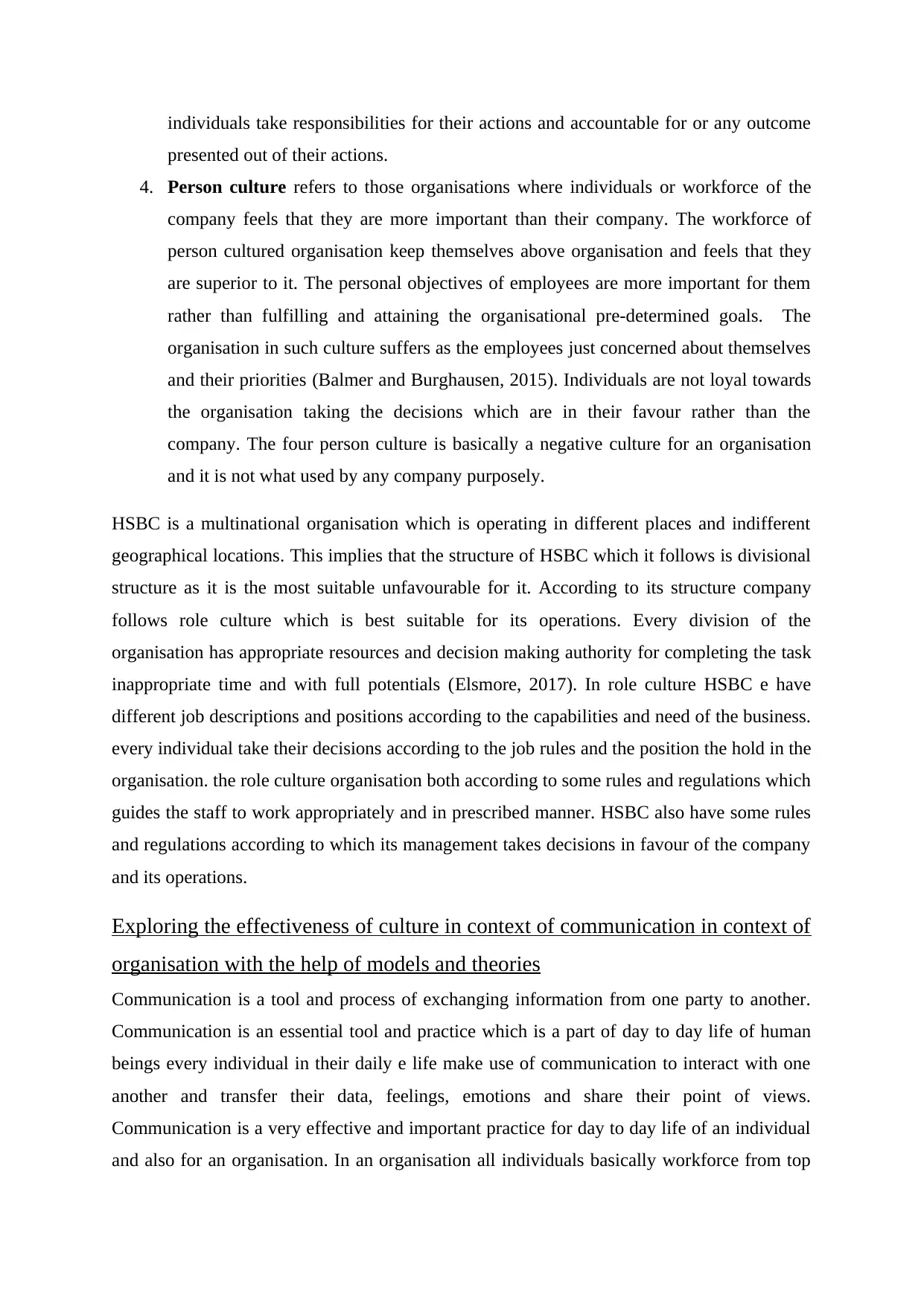
individuals take responsibilities for their actions and accountable for or any outcome
presented out of their actions.
4. Person culture refers to those organisations where individuals or workforce of the
company feels that they are more important than their company. The workforce of
person cultured organisation keep themselves above organisation and feels that they
are superior to it. The personal objectives of employees are more important for them
rather than fulfilling and attaining the organisational pre-determined goals. The
organisation in such culture suffers as the employees just concerned about themselves
and their priorities (Balmer and Burghausen, 2015). Individuals are not loyal towards
the organisation taking the decisions which are in their favour rather than the
company. The four person culture is basically a negative culture for an organisation
and it is not what used by any company purposely.
HSBC is a multinational organisation which is operating in different places and indifferent
geographical locations. This implies that the structure of HSBC which it follows is divisional
structure as it is the most suitable unfavourable for it. According to its structure company
follows role culture which is best suitable for its operations. Every division of the
organisation has appropriate resources and decision making authority for completing the task
inappropriate time and with full potentials (Elsmore, 2017). In role culture HSBC e have
different job descriptions and positions according to the capabilities and need of the business.
every individual take their decisions according to the job rules and the position the hold in the
organisation. the role culture organisation both according to some rules and regulations which
guides the staff to work appropriately and in prescribed manner. HSBC also have some rules
and regulations according to which its management takes decisions in favour of the company
and its operations.
Exploring the effectiveness of culture in context of communication in context of
organisation with the help of models and theories
Communication is a tool and process of exchanging information from one party to another.
Communication is an essential tool and practice which is a part of day to day life of human
beings every individual in their daily e life make use of communication to interact with one
another and transfer their data, feelings, emotions and share their point of views.
Communication is a very effective and important practice for day to day life of an individual
and also for an organisation. In an organisation all individuals basically workforce from top
presented out of their actions.
4. Person culture refers to those organisations where individuals or workforce of the
company feels that they are more important than their company. The workforce of
person cultured organisation keep themselves above organisation and feels that they
are superior to it. The personal objectives of employees are more important for them
rather than fulfilling and attaining the organisational pre-determined goals. The
organisation in such culture suffers as the employees just concerned about themselves
and their priorities (Balmer and Burghausen, 2015). Individuals are not loyal towards
the organisation taking the decisions which are in their favour rather than the
company. The four person culture is basically a negative culture for an organisation
and it is not what used by any company purposely.
HSBC is a multinational organisation which is operating in different places and indifferent
geographical locations. This implies that the structure of HSBC which it follows is divisional
structure as it is the most suitable unfavourable for it. According to its structure company
follows role culture which is best suitable for its operations. Every division of the
organisation has appropriate resources and decision making authority for completing the task
inappropriate time and with full potentials (Elsmore, 2017). In role culture HSBC e have
different job descriptions and positions according to the capabilities and need of the business.
every individual take their decisions according to the job rules and the position the hold in the
organisation. the role culture organisation both according to some rules and regulations which
guides the staff to work appropriately and in prescribed manner. HSBC also have some rules
and regulations according to which its management takes decisions in favour of the company
and its operations.
Exploring the effectiveness of culture in context of communication in context of
organisation with the help of models and theories
Communication is a tool and process of exchanging information from one party to another.
Communication is an essential tool and practice which is a part of day to day life of human
beings every individual in their daily e life make use of communication to interact with one
another and transfer their data, feelings, emotions and share their point of views.
Communication is a very effective and important practice for day to day life of an individual
and also for an organisation. In an organisation all individuals basically workforce from top
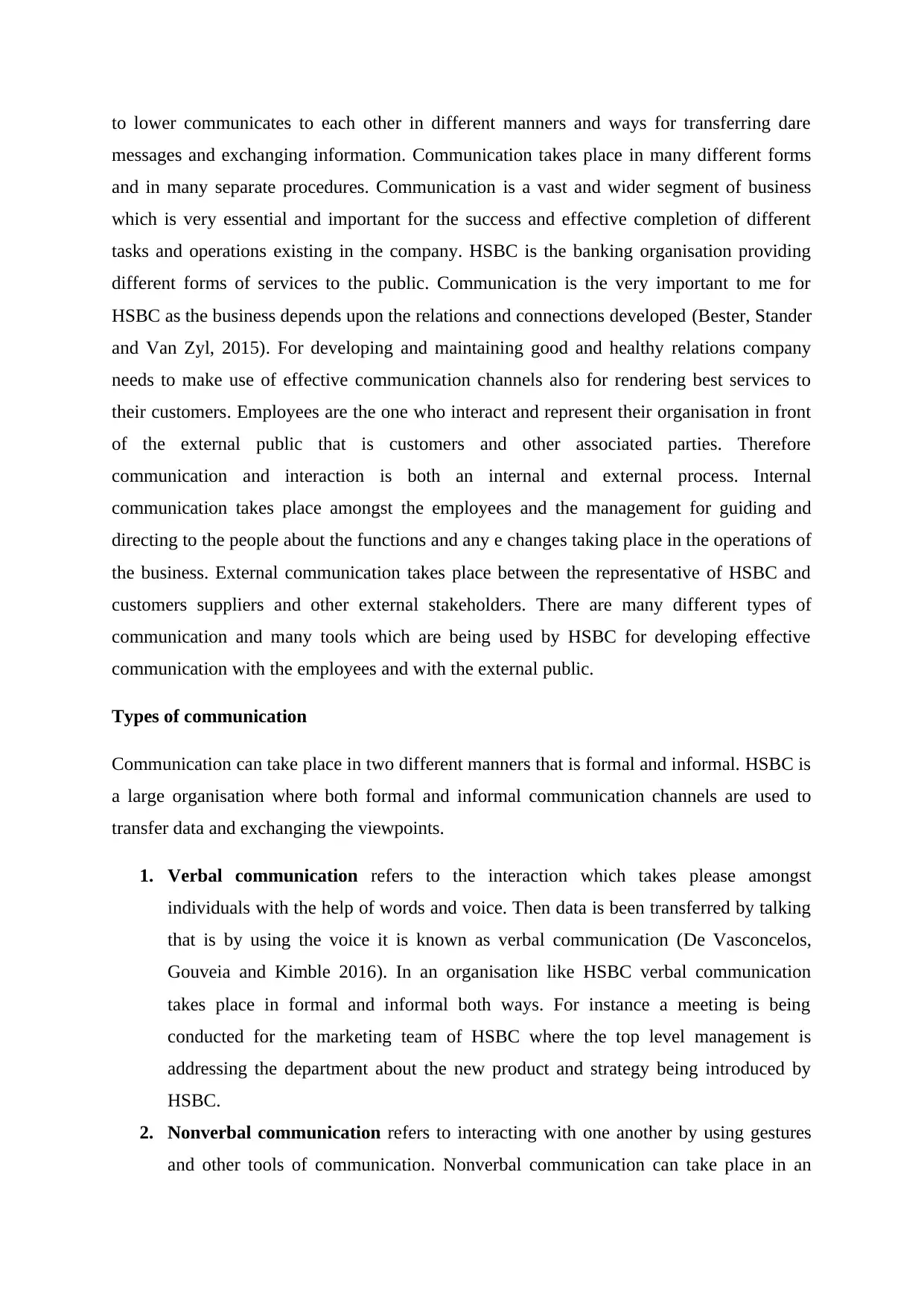
to lower communicates to each other in different manners and ways for transferring dare
messages and exchanging information. Communication takes place in many different forms
and in many separate procedures. Communication is a vast and wider segment of business
which is very essential and important for the success and effective completion of different
tasks and operations existing in the company. HSBC is the banking organisation providing
different forms of services to the public. Communication is the very important to me for
HSBC as the business depends upon the relations and connections developed (Bester, Stander
and Van Zyl, 2015). For developing and maintaining good and healthy relations company
needs to make use of effective communication channels also for rendering best services to
their customers. Employees are the one who interact and represent their organisation in front
of the external public that is customers and other associated parties. Therefore
communication and interaction is both an internal and external process. Internal
communication takes place amongst the employees and the management for guiding and
directing to the people about the functions and any e changes taking place in the operations of
the business. External communication takes place between the representative of HSBC and
customers suppliers and other external stakeholders. There are many different types of
communication and many tools which are being used by HSBC for developing effective
communication with the employees and with the external public.
Types of communication
Communication can take place in two different manners that is formal and informal. HSBC is
a large organisation where both formal and informal communication channels are used to
transfer data and exchanging the viewpoints.
1. Verbal communication refers to the interaction which takes please amongst
individuals with the help of words and voice. Then data is been transferred by talking
that is by using the voice it is known as verbal communication (De Vasconcelos,
Gouveia and Kimble 2016). In an organisation like HSBC verbal communication
takes place in formal and informal both ways. For instance a meeting is being
conducted for the marketing team of HSBC where the top level management is
addressing the department about the new product and strategy being introduced by
HSBC.
2. Nonverbal communication refers to interacting with one another by using gestures
and other tools of communication. Nonverbal communication can take place in an
messages and exchanging information. Communication takes place in many different forms
and in many separate procedures. Communication is a vast and wider segment of business
which is very essential and important for the success and effective completion of different
tasks and operations existing in the company. HSBC is the banking organisation providing
different forms of services to the public. Communication is the very important to me for
HSBC as the business depends upon the relations and connections developed (Bester, Stander
and Van Zyl, 2015). For developing and maintaining good and healthy relations company
needs to make use of effective communication channels also for rendering best services to
their customers. Employees are the one who interact and represent their organisation in front
of the external public that is customers and other associated parties. Therefore
communication and interaction is both an internal and external process. Internal
communication takes place amongst the employees and the management for guiding and
directing to the people about the functions and any e changes taking place in the operations of
the business. External communication takes place between the representative of HSBC and
customers suppliers and other external stakeholders. There are many different types of
communication and many tools which are being used by HSBC for developing effective
communication with the employees and with the external public.
Types of communication
Communication can take place in two different manners that is formal and informal. HSBC is
a large organisation where both formal and informal communication channels are used to
transfer data and exchanging the viewpoints.
1. Verbal communication refers to the interaction which takes please amongst
individuals with the help of words and voice. Then data is been transferred by talking
that is by using the voice it is known as verbal communication (De Vasconcelos,
Gouveia and Kimble 2016). In an organisation like HSBC verbal communication
takes place in formal and informal both ways. For instance a meeting is being
conducted for the marketing team of HSBC where the top level management is
addressing the department about the new product and strategy being introduced by
HSBC.
2. Nonverbal communication refers to interacting with one another by using gestures
and other tools of communication. Nonverbal communication can take place in an
⊘ This is a preview!⊘
Do you want full access?
Subscribe today to unlock all pages.

Trusted by 1+ million students worldwide
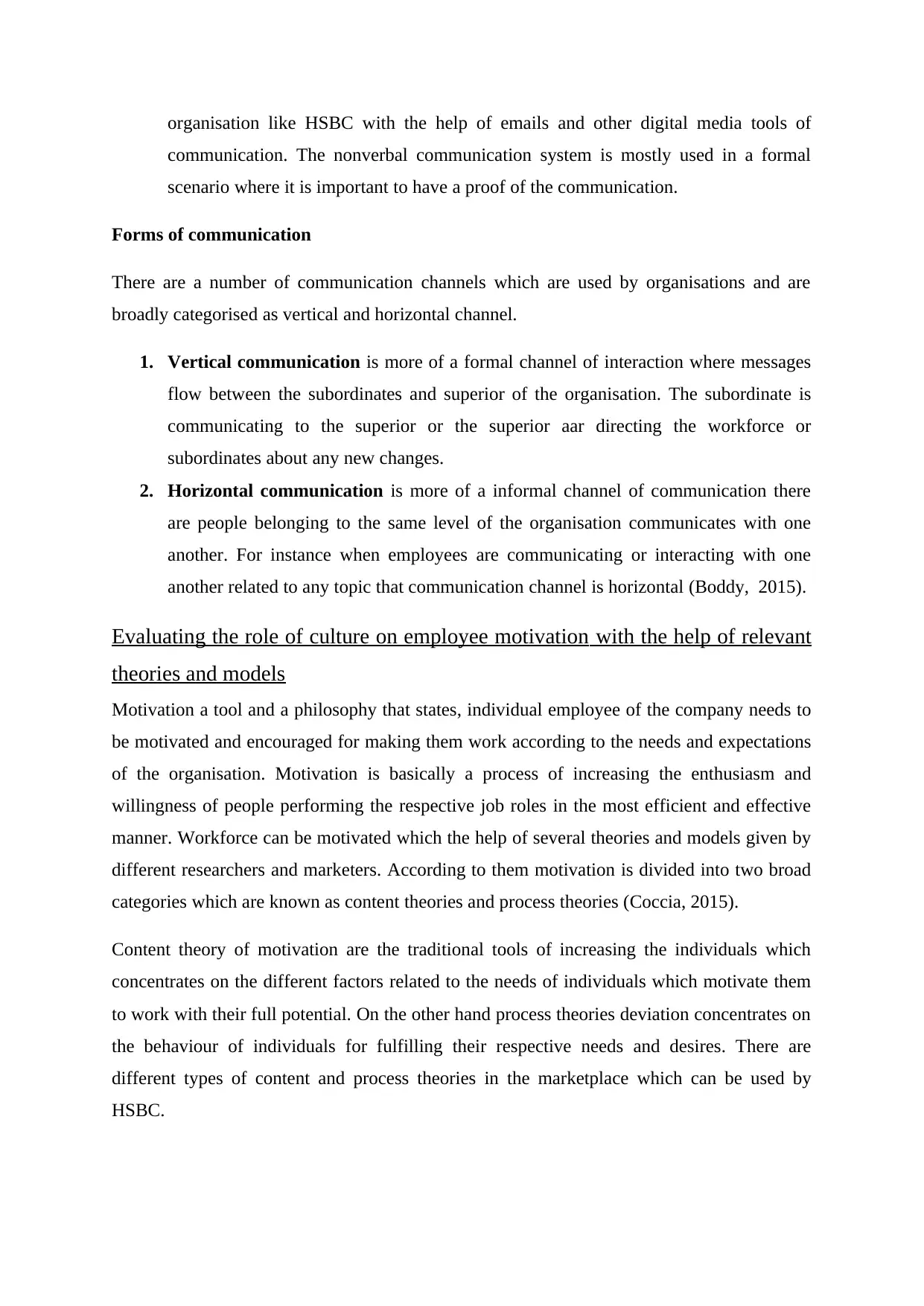
organisation like HSBC with the help of emails and other digital media tools of
communication. The nonverbal communication system is mostly used in a formal
scenario where it is important to have a proof of the communication.
Forms of communication
There are a number of communication channels which are used by organisations and are
broadly categorised as vertical and horizontal channel.
1. Vertical communication is more of a formal channel of interaction where messages
flow between the subordinates and superior of the organisation. The subordinate is
communicating to the superior or the superior aar directing the workforce or
subordinates about any new changes.
2. Horizontal communication is more of a informal channel of communication there
are people belonging to the same level of the organisation communicates with one
another. For instance when employees are communicating or interacting with one
another related to any topic that communication channel is horizontal (Boddy, 2015).
Evaluating the role of culture on employee motivation with the help of relevant
theories and models
Motivation a tool and a philosophy that states, individual employee of the company needs to
be motivated and encouraged for making them work according to the needs and expectations
of the organisation. Motivation is basically a process of increasing the enthusiasm and
willingness of people performing the respective job roles in the most efficient and effective
manner. Workforce can be motivated which the help of several theories and models given by
different researchers and marketers. According to them motivation is divided into two broad
categories which are known as content theories and process theories (Coccia, 2015).
Content theory of motivation are the traditional tools of increasing the individuals which
concentrates on the different factors related to the needs of individuals which motivate them
to work with their full potential. On the other hand process theories deviation concentrates on
the behaviour of individuals for fulfilling their respective needs and desires. There are
different types of content and process theories in the marketplace which can be used by
HSBC.
communication. The nonverbal communication system is mostly used in a formal
scenario where it is important to have a proof of the communication.
Forms of communication
There are a number of communication channels which are used by organisations and are
broadly categorised as vertical and horizontal channel.
1. Vertical communication is more of a formal channel of interaction where messages
flow between the subordinates and superior of the organisation. The subordinate is
communicating to the superior or the superior aar directing the workforce or
subordinates about any new changes.
2. Horizontal communication is more of a informal channel of communication there
are people belonging to the same level of the organisation communicates with one
another. For instance when employees are communicating or interacting with one
another related to any topic that communication channel is horizontal (Boddy, 2015).
Evaluating the role of culture on employee motivation with the help of relevant
theories and models
Motivation a tool and a philosophy that states, individual employee of the company needs to
be motivated and encouraged for making them work according to the needs and expectations
of the organisation. Motivation is basically a process of increasing the enthusiasm and
willingness of people performing the respective job roles in the most efficient and effective
manner. Workforce can be motivated which the help of several theories and models given by
different researchers and marketers. According to them motivation is divided into two broad
categories which are known as content theories and process theories (Coccia, 2015).
Content theory of motivation are the traditional tools of increasing the individuals which
concentrates on the different factors related to the needs of individuals which motivate them
to work with their full potential. On the other hand process theories deviation concentrates on
the behaviour of individuals for fulfilling their respective needs and desires. There are
different types of content and process theories in the marketplace which can be used by
HSBC.
Paraphrase This Document
Need a fresh take? Get an instant paraphrase of this document with our AI Paraphraser
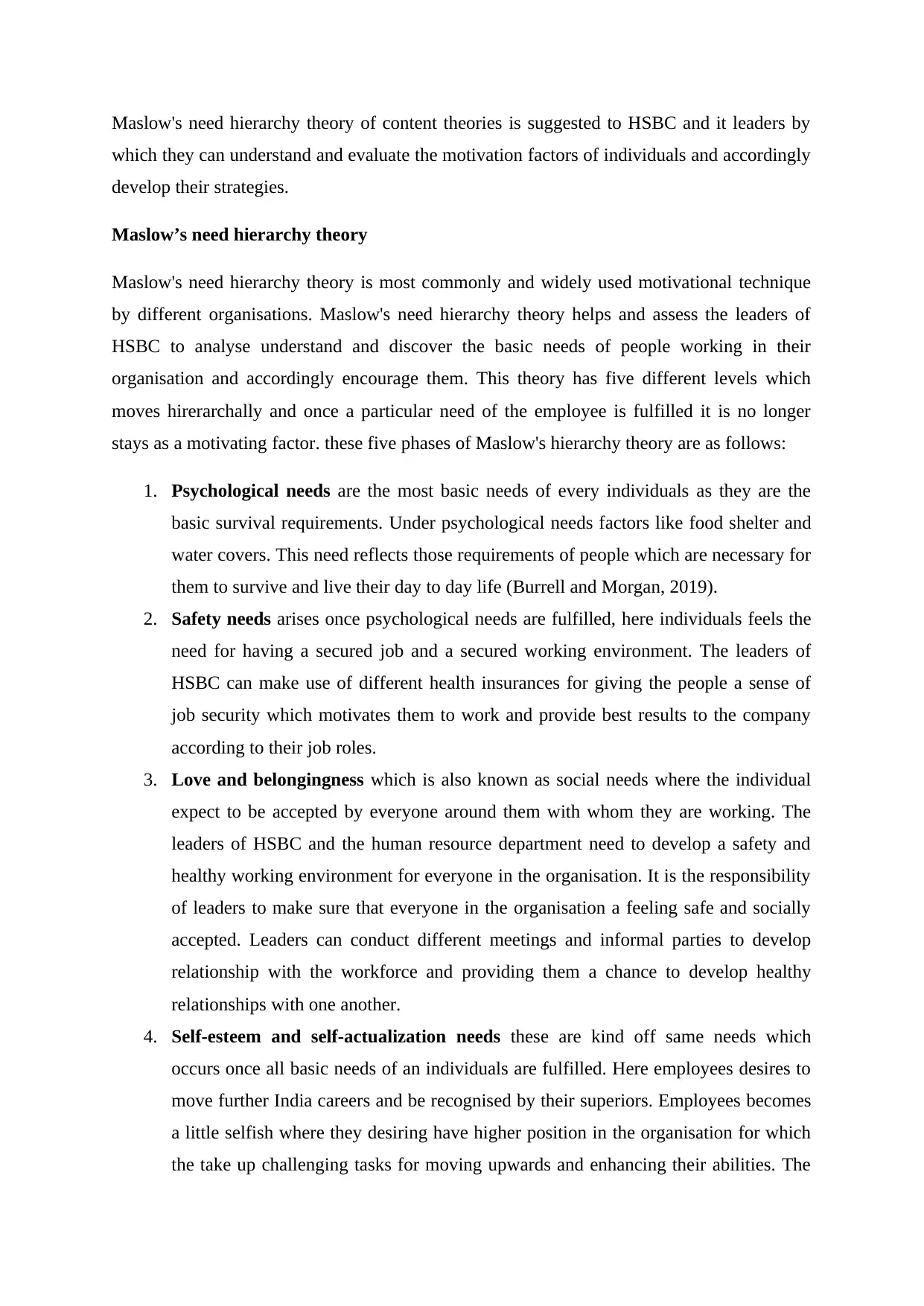
Maslow's need hierarchy theory of content theories is suggested to HSBC and it leaders by
which they can understand and evaluate the motivation factors of individuals and accordingly
develop their strategies.
Maslow’s need hierarchy theory
Maslow's need hierarchy theory is most commonly and widely used motivational technique
by different organisations. Maslow's need hierarchy theory helps and assess the leaders of
HSBC to analyse understand and discover the basic needs of people working in their
organisation and accordingly encourage them. This theory has five different levels which
moves hirerarchally and once a particular need of the employee is fulfilled it is no longer
stays as a motivating factor. these five phases of Maslow's hierarchy theory are as follows:
1. Psychological needs are the most basic needs of every individuals as they are the
basic survival requirements. Under psychological needs factors like food shelter and
water covers. This need reflects those requirements of people which are necessary for
them to survive and live their day to day life (Burrell and Morgan, 2019).
2. Safety needs arises once psychological needs are fulfilled, here individuals feels the
need for having a secured job and a secured working environment. The leaders of
HSBC can make use of different health insurances for giving the people a sense of
job security which motivates them to work and provide best results to the company
according to their job roles.
3. Love and belongingness which is also known as social needs where the individual
expect to be accepted by everyone around them with whom they are working. The
leaders of HSBC and the human resource department need to develop a safety and
healthy working environment for everyone in the organisation. It is the responsibility
of leaders to make sure that everyone in the organisation a feeling safe and socially
accepted. Leaders can conduct different meetings and informal parties to develop
relationship with the workforce and providing them a chance to develop healthy
relationships with one another.
4. Self-esteem and self-actualization needs these are kind off same needs which
occurs once all basic needs of an individuals are fulfilled. Here employees desires to
move further India careers and be recognised by their superiors. Employees becomes
a little selfish where they desiring have higher position in the organisation for which
the take up challenging tasks for moving upwards and enhancing their abilities. The
which they can understand and evaluate the motivation factors of individuals and accordingly
develop their strategies.
Maslow’s need hierarchy theory
Maslow's need hierarchy theory is most commonly and widely used motivational technique
by different organisations. Maslow's need hierarchy theory helps and assess the leaders of
HSBC to analyse understand and discover the basic needs of people working in their
organisation and accordingly encourage them. This theory has five different levels which
moves hirerarchally and once a particular need of the employee is fulfilled it is no longer
stays as a motivating factor. these five phases of Maslow's hierarchy theory are as follows:
1. Psychological needs are the most basic needs of every individuals as they are the
basic survival requirements. Under psychological needs factors like food shelter and
water covers. This need reflects those requirements of people which are necessary for
them to survive and live their day to day life (Burrell and Morgan, 2019).
2. Safety needs arises once psychological needs are fulfilled, here individuals feels the
need for having a secured job and a secured working environment. The leaders of
HSBC can make use of different health insurances for giving the people a sense of
job security which motivates them to work and provide best results to the company
according to their job roles.
3. Love and belongingness which is also known as social needs where the individual
expect to be accepted by everyone around them with whom they are working. The
leaders of HSBC and the human resource department need to develop a safety and
healthy working environment for everyone in the organisation. It is the responsibility
of leaders to make sure that everyone in the organisation a feeling safe and socially
accepted. Leaders can conduct different meetings and informal parties to develop
relationship with the workforce and providing them a chance to develop healthy
relationships with one another.
4. Self-esteem and self-actualization needs these are kind off same needs which
occurs once all basic needs of an individuals are fulfilled. Here employees desires to
move further India careers and be recognised by their superiors. Employees becomes
a little selfish where they desiring have higher position in the organisation for which
the take up challenging tasks for moving upwards and enhancing their abilities. The
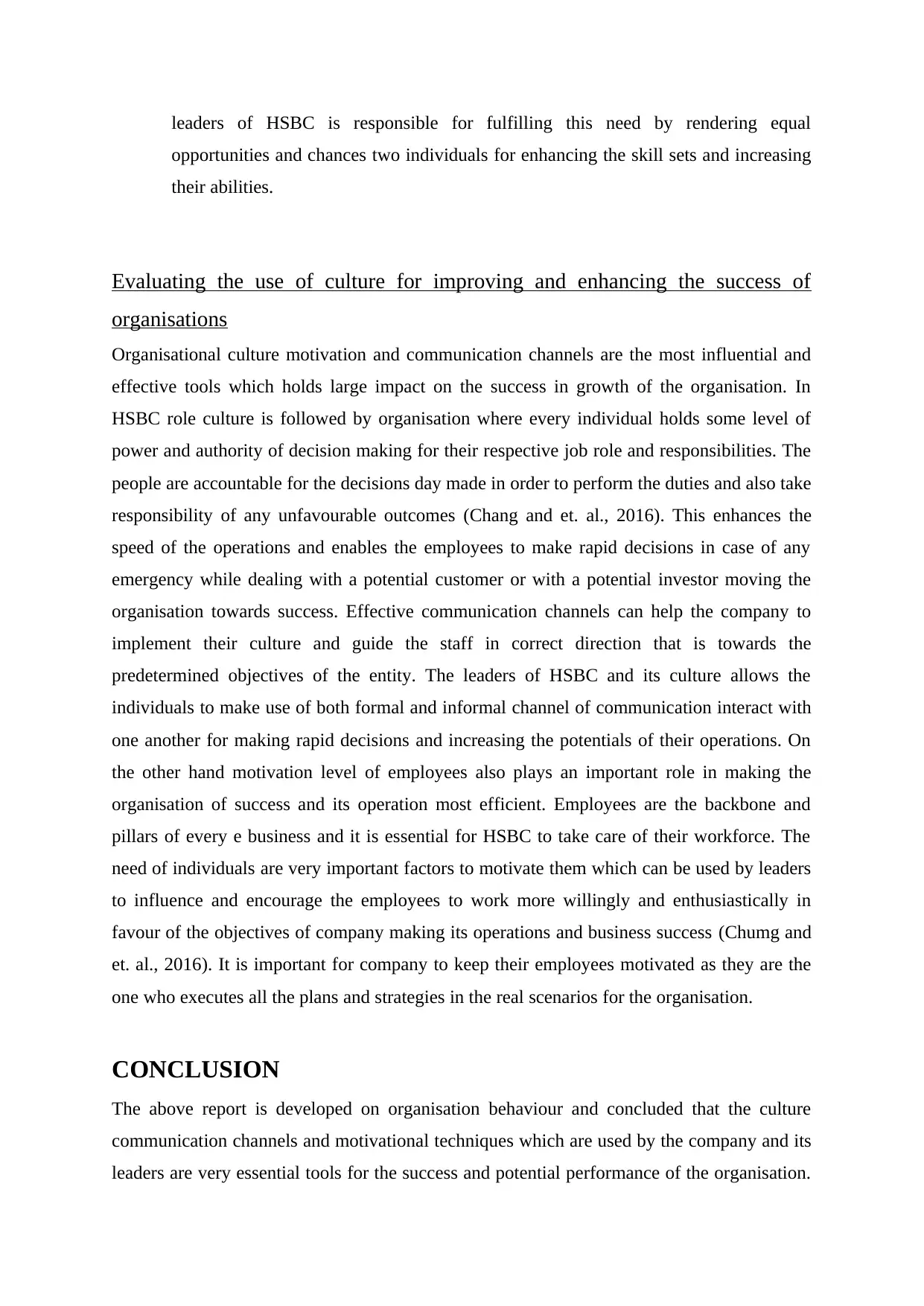
leaders of HSBC is responsible for fulfilling this need by rendering equal
opportunities and chances two individuals for enhancing the skill sets and increasing
their abilities.
Evaluating the use of culture for improving and enhancing the success of
organisations
Organisational culture motivation and communication channels are the most influential and
effective tools which holds large impact on the success in growth of the organisation. In
HSBC role culture is followed by organisation where every individual holds some level of
power and authority of decision making for their respective job role and responsibilities. The
people are accountable for the decisions day made in order to perform the duties and also take
responsibility of any unfavourable outcomes (Chang and et. al., 2016). This enhances the
speed of the operations and enables the employees to make rapid decisions in case of any
emergency while dealing with a potential customer or with a potential investor moving the
organisation towards success. Effective communication channels can help the company to
implement their culture and guide the staff in correct direction that is towards the
predetermined objectives of the entity. The leaders of HSBC and its culture allows the
individuals to make use of both formal and informal channel of communication interact with
one another for making rapid decisions and increasing the potentials of their operations. On
the other hand motivation level of employees also plays an important role in making the
organisation of success and its operation most efficient. Employees are the backbone and
pillars of every e business and it is essential for HSBC to take care of their workforce. The
need of individuals are very important factors to motivate them which can be used by leaders
to influence and encourage the employees to work more willingly and enthusiastically in
favour of the objectives of company making its operations and business success (Chumg and
et. al., 2016). It is important for company to keep their employees motivated as they are the
one who executes all the plans and strategies in the real scenarios for the organisation.
CONCLUSION
The above report is developed on organisation behaviour and concluded that the culture
communication channels and motivational techniques which are used by the company and its
leaders are very essential tools for the success and potential performance of the organisation.
opportunities and chances two individuals for enhancing the skill sets and increasing
their abilities.
Evaluating the use of culture for improving and enhancing the success of
organisations
Organisational culture motivation and communication channels are the most influential and
effective tools which holds large impact on the success in growth of the organisation. In
HSBC role culture is followed by organisation where every individual holds some level of
power and authority of decision making for their respective job role and responsibilities. The
people are accountable for the decisions day made in order to perform the duties and also take
responsibility of any unfavourable outcomes (Chang and et. al., 2016). This enhances the
speed of the operations and enables the employees to make rapid decisions in case of any
emergency while dealing with a potential customer or with a potential investor moving the
organisation towards success. Effective communication channels can help the company to
implement their culture and guide the staff in correct direction that is towards the
predetermined objectives of the entity. The leaders of HSBC and its culture allows the
individuals to make use of both formal and informal channel of communication interact with
one another for making rapid decisions and increasing the potentials of their operations. On
the other hand motivation level of employees also plays an important role in making the
organisation of success and its operation most efficient. Employees are the backbone and
pillars of every e business and it is essential for HSBC to take care of their workforce. The
need of individuals are very important factors to motivate them which can be used by leaders
to influence and encourage the employees to work more willingly and enthusiastically in
favour of the objectives of company making its operations and business success (Chumg and
et. al., 2016). It is important for company to keep their employees motivated as they are the
one who executes all the plans and strategies in the real scenarios for the organisation.
CONCLUSION
The above report is developed on organisation behaviour and concluded that the culture
communication channels and motivational techniques which are used by the company and its
leaders are very essential tools for the success and potential performance of the organisation.
⊘ This is a preview!⊘
Do you want full access?
Subscribe today to unlock all pages.

Trusted by 1+ million students worldwide
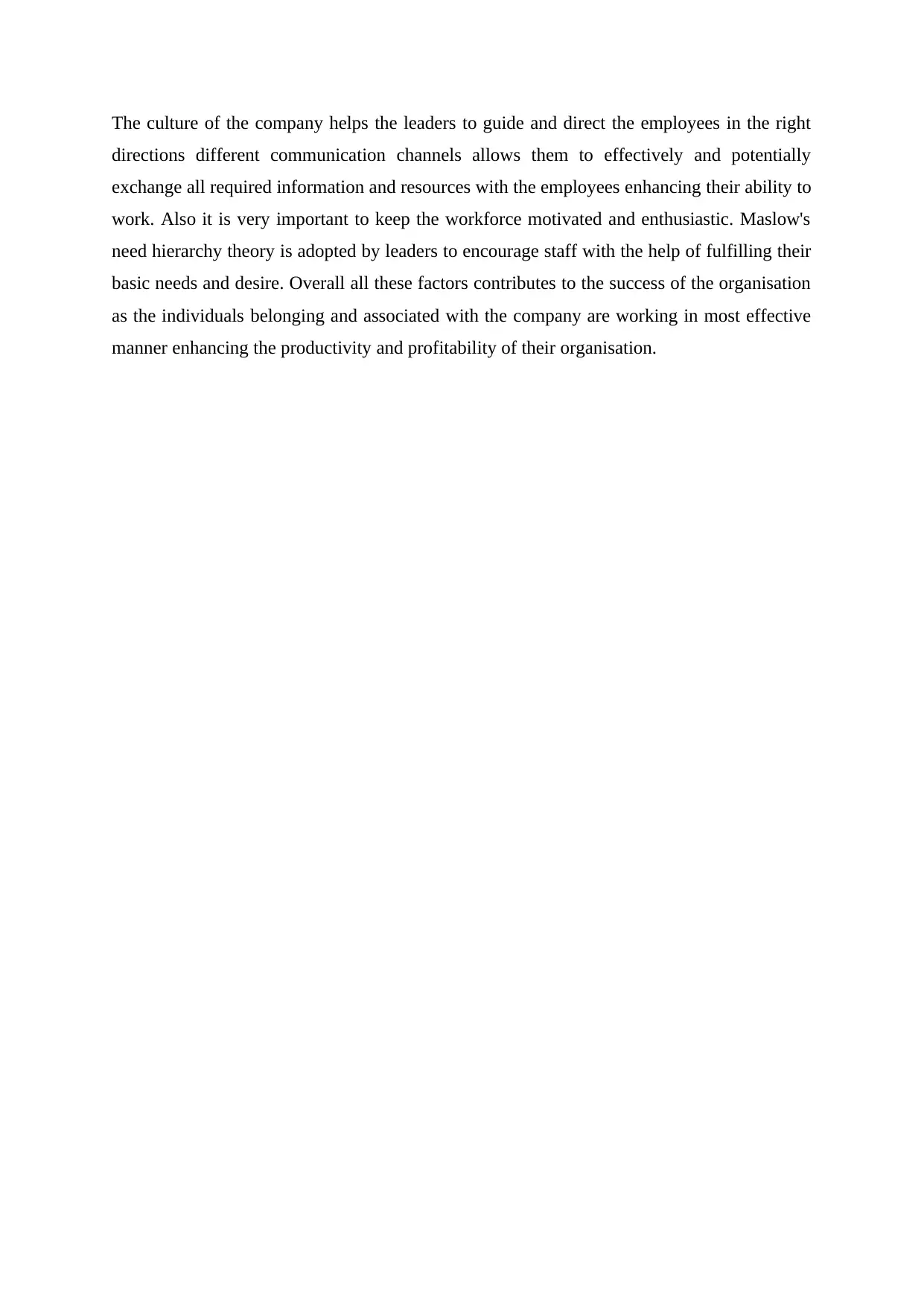
The culture of the company helps the leaders to guide and direct the employees in the right
directions different communication channels allows them to effectively and potentially
exchange all required information and resources with the employees enhancing their ability to
work. Also it is very important to keep the workforce motivated and enthusiastic. Maslow's
need hierarchy theory is adopted by leaders to encourage staff with the help of fulfilling their
basic needs and desire. Overall all these factors contributes to the success of the organisation
as the individuals belonging and associated with the company are working in most effective
manner enhancing the productivity and profitability of their organisation.
directions different communication channels allows them to effectively and potentially
exchange all required information and resources with the employees enhancing their ability to
work. Also it is very important to keep the workforce motivated and enthusiastic. Maslow's
need hierarchy theory is adopted by leaders to encourage staff with the help of fulfilling their
basic needs and desire. Overall all these factors contributes to the success of the organisation
as the individuals belonging and associated with the company are working in most effective
manner enhancing the productivity and profitability of their organisation.
Paraphrase This Document
Need a fresh take? Get an instant paraphrase of this document with our AI Paraphraser
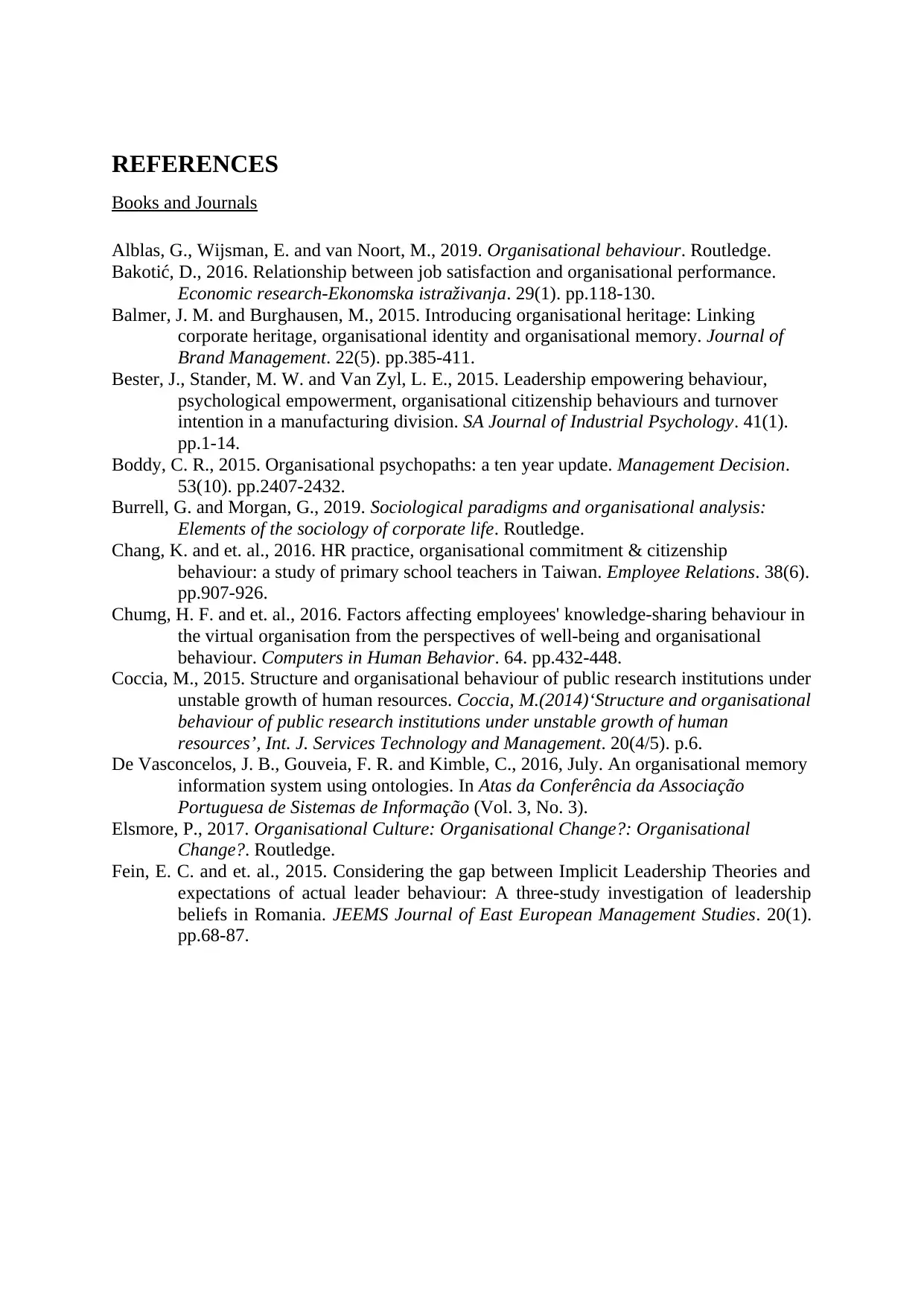
REFERENCES
Books and Journals
Alblas, G., Wijsman, E. and van Noort, M., 2019. Organisational behaviour. Routledge.
Bakotić, D., 2016. Relationship between job satisfaction and organisational performance.
Economic research-Ekonomska istraživanja. 29(1). pp.118-130.
Balmer, J. M. and Burghausen, M., 2015. Introducing organisational heritage: Linking
corporate heritage, organisational identity and organisational memory. Journal of
Brand Management. 22(5). pp.385-411.
Bester, J., Stander, M. W. and Van Zyl, L. E., 2015. Leadership empowering behaviour,
psychological empowerment, organisational citizenship behaviours and turnover
intention in a manufacturing division. SA Journal of Industrial Psychology. 41(1).
pp.1-14.
Boddy, C. R., 2015. Organisational psychopaths: a ten year update. Management Decision.
53(10). pp.2407-2432.
Burrell, G. and Morgan, G., 2019. Sociological paradigms and organisational analysis:
Elements of the sociology of corporate life. Routledge.
Chang, K. and et. al., 2016. HR practice, organisational commitment & citizenship
behaviour: a study of primary school teachers in Taiwan. Employee Relations. 38(6).
pp.907-926.
Chumg, H. F. and et. al., 2016. Factors affecting employees' knowledge-sharing behaviour in
the virtual organisation from the perspectives of well-being and organisational
behaviour. Computers in Human Behavior. 64. pp.432-448.
Coccia, M., 2015. Structure and organisational behaviour of public research institutions under
unstable growth of human resources. Coccia, M.(2014)‘Structure and organisational
behaviour of public research institutions under unstable growth of human
resources’, Int. J. Services Technology and Management. 20(4/5). p.6.
De Vasconcelos, J. B., Gouveia, F. R. and Kimble, C., 2016, July. An organisational memory
information system using ontologies. In Atas da Conferência da Associação
Portuguesa de Sistemas de Informação (Vol. 3, No. 3).
Elsmore, P., 2017. Organisational Culture: Organisational Change?: Organisational
Change?. Routledge.
Fein, E. C. and et. al., 2015. Considering the gap between Implicit Leadership Theories and
expectations of actual leader behaviour: A three-study investigation of leadership
beliefs in Romania. JEEMS Journal of East European Management Studies. 20(1).
pp.68-87.
Books and Journals
Alblas, G., Wijsman, E. and van Noort, M., 2019. Organisational behaviour. Routledge.
Bakotić, D., 2016. Relationship between job satisfaction and organisational performance.
Economic research-Ekonomska istraživanja. 29(1). pp.118-130.
Balmer, J. M. and Burghausen, M., 2015. Introducing organisational heritage: Linking
corporate heritage, organisational identity and organisational memory. Journal of
Brand Management. 22(5). pp.385-411.
Bester, J., Stander, M. W. and Van Zyl, L. E., 2015. Leadership empowering behaviour,
psychological empowerment, organisational citizenship behaviours and turnover
intention in a manufacturing division. SA Journal of Industrial Psychology. 41(1).
pp.1-14.
Boddy, C. R., 2015. Organisational psychopaths: a ten year update. Management Decision.
53(10). pp.2407-2432.
Burrell, G. and Morgan, G., 2019. Sociological paradigms and organisational analysis:
Elements of the sociology of corporate life. Routledge.
Chang, K. and et. al., 2016. HR practice, organisational commitment & citizenship
behaviour: a study of primary school teachers in Taiwan. Employee Relations. 38(6).
pp.907-926.
Chumg, H. F. and et. al., 2016. Factors affecting employees' knowledge-sharing behaviour in
the virtual organisation from the perspectives of well-being and organisational
behaviour. Computers in Human Behavior. 64. pp.432-448.
Coccia, M., 2015. Structure and organisational behaviour of public research institutions under
unstable growth of human resources. Coccia, M.(2014)‘Structure and organisational
behaviour of public research institutions under unstable growth of human
resources’, Int. J. Services Technology and Management. 20(4/5). p.6.
De Vasconcelos, J. B., Gouveia, F. R. and Kimble, C., 2016, July. An organisational memory
information system using ontologies. In Atas da Conferência da Associação
Portuguesa de Sistemas de Informação (Vol. 3, No. 3).
Elsmore, P., 2017. Organisational Culture: Organisational Change?: Organisational
Change?. Routledge.
Fein, E. C. and et. al., 2015. Considering the gap between Implicit Leadership Theories and
expectations of actual leader behaviour: A three-study investigation of leadership
beliefs in Romania. JEEMS Journal of East European Management Studies. 20(1).
pp.68-87.

⊘ This is a preview!⊘
Do you want full access?
Subscribe today to unlock all pages.

Trusted by 1+ million students worldwide
1 out of 12
Related Documents
Your All-in-One AI-Powered Toolkit for Academic Success.
+13062052269
info@desklib.com
Available 24*7 on WhatsApp / Email
![[object Object]](/_next/static/media/star-bottom.7253800d.svg)
Unlock your academic potential
Copyright © 2020–2026 A2Z Services. All Rights Reserved. Developed and managed by ZUCOL.




